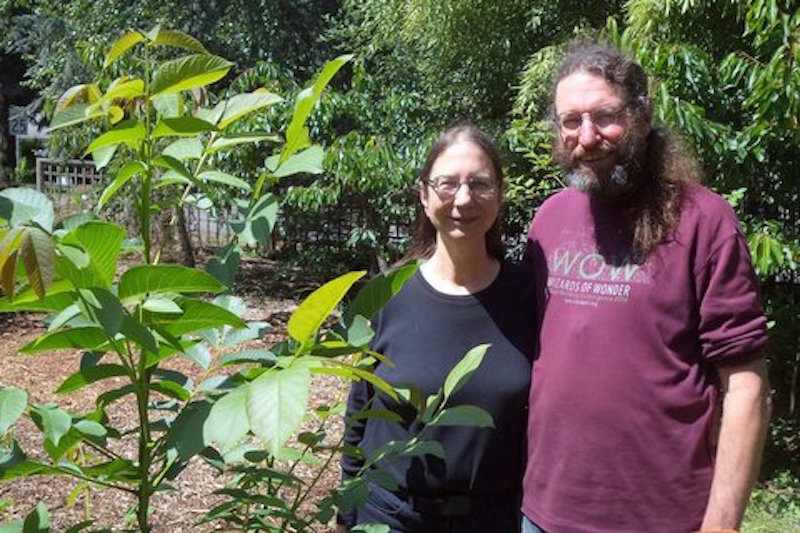
A newly-planted English walnut tree at Wahkeena Woods with Jon Biemer and his wife Willow
By Jon Biemer
As one of the Biodynamic Association’s newest members, I would like to share why I joined. First, I will share where I’m coming from.
Over the last decade I advocated for the idea of the Environmental Handprint. The Handprint is an emerging way of characterizing the environmental good we do. It complements the Ecological Footprint, which focuses on our resource consumption and waste production. The potential for the Handprint is unlimited, which allows us to truly benefit society and the environment. Planting a tree is my favorite example of an Environmental Handprint. It keeps on taking care of the air, the land, and a host of animals long after the thoughtful, but distractible, human moves on. The ultimate benefit of a Handprint often extends beyond our awareness.
In researching my upcoming book, I learned about biodynamics and Rudolf Steiner. As readers of this blog know, Steiner partnered with farmers during the 1920s in Koberwitz to birth biodynamic farming as a movement. This in itself is a wonderful Handprint that continues in its reach and depth today.
For that matter, every biodynamic farm ecosystem is a Handprint. Handprints come in all sizes.
I am also fascinated by the progeny of the early biodynamic practices and practitioners. Each, in its own right, is a Collective Handprint – the work of many.
The idea of producer-consumer alliance, practiced by biodynamic communities in post-World-War-II Europe, leaped the ocean in the 1980s to become known as Community Supported Agriculture (CSA).[i] By one estimate we have over six thousand CSAs in the U.S.[ii]
Steiner’s teachings and initiative founded Waldorf schools, approaching education as an art that “speaks to the child’s experience.” [iii] There are now about a thousand Waldorf schools in sixty countries.[iv]
Walter James, who hosted the first biodynamic conference in England in 1939, wrote Look to the Land the next year. In it he coined the term “organic farming” from the concept of the farm as an organism.[v] “Organic” sales now amount to five percent of food sales in the United States.[vi]
Why did I join the BDA? Forming a spiritual relationship with the soil fits with my values. Viewing a farm – and our urban food forest – as holistic systems feels right. Besides, being a “Soil Builder” aligns with my thinking and aspirations.
Jon Biemer lives in Portland, Oregon. The book he is writing has the working title Healing Our Planet: How Handprints Create Sustainability. It celebrates positive developments in sustainability and suggests ways individuals can make a difference.
References
[i] “The History of Community Supported Agriculture – Part I,” by Steven McFadden, Rodale Institute, January 2004. Online at https://rodaleinstitute.org/the-history-of-community-supported-agricultu... (accessed 5-27-18).
[ii] “Unraveling the CSA Number Conundrum.” By Steven McFadden, The Call of the Land (circa 2013). Online at https://thecalloftheland.wordpress.com/2012/01/09/unraveling-the-csa-num... (accessed 5-28-18).
[iii] “Waldorf Education on a Farm,” Sunnyfield Farm. Online at http://sunfieldfarm.org/waldorf-school/waldorf-education-on-a-farm/ (accessed 5-28-18).
[iv] “Frequently Asked Questions,” Waldorf Answers. Online at http://www.waldorfanswers.org/WaldorfFAQ.htm#5 (accessed 5-30-18).
[v] Paull, John, “Lord Northbourne, the man who invented organic farming, a biography,” Uploaded to Scribd. Book abstract online at https://www.scribd.com/document/325217700/Lord-Northbourne-The-Man-Who-I... (accessed 5-28-18).
[vi] “Market Analysis,” Organic Trade Association. Online at https://www.ota.com/resources/market-analysis (accessed 5-30-18).

Añadir nuevo comentario